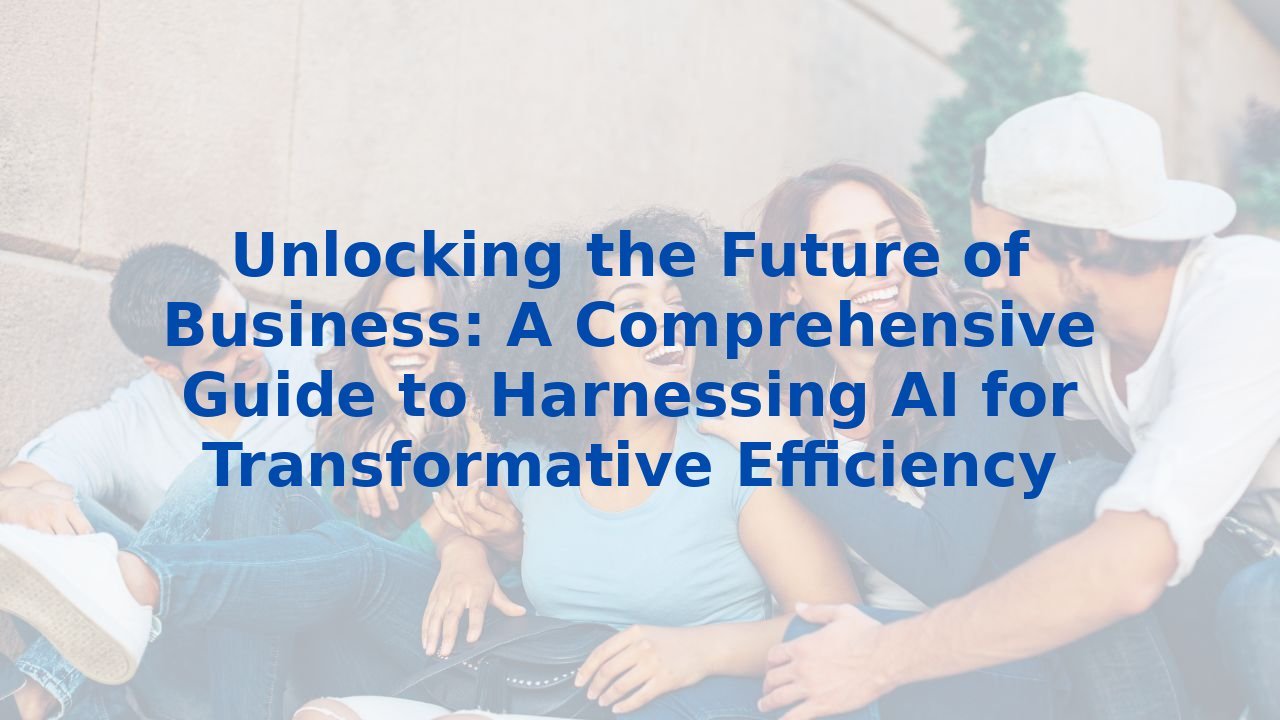Unlocking the Future of Business: A Comprehensive Guide to Harnessing AI for Transformative Efficiency
Unlocking the Future of Business: A Comprehensive Guide to Harnessing AI for Transformative Efficiency
As businesses navigate an ever-evolving landscape, the need for operational efficiency and innovation grows exponentially. Artificial Intelligence (AI) emerges not merely as a buzzword but as a pivotal force that can reshape how organizations operate, interact, and excel. This guide explores the transformative capabilities of AI in various business processes, illuminating its potential to enhance efficiency and drive sustainable growth.
Process Optimization
One of the most profound impacts of AI is in process optimization. By automating repetitive and time-consuming tasks, AI liberates employees from mundane activities, allowing them to engage in higher-value work that requires creativity and problem-solving. Take, for example, the world of Human Resources: automating data entry or initial resume screenings not only reduces human error but elevates the work of HR professionals, enabling them to focus on strategic talent acquisition that drives an organization’s success.
Data Analysis and Insights
In a data-driven age, the ability to swiftly analyze vast amounts of information can be a game changer. AI excels at sifting through complex datasets, providing actionable insights that inform strategic decision-making. It can uncover hidden patterns and trends that may elude human scrutiny, thus enabling businesses to optimize resource allocation and anticipate future market demands with remarkable accuracy.
Predictive Analytics
Another area where AI shines is in predictive analytics. By leveraging historical data and real-time inputs, AI can forecast market trends and consumer behaviors. This foresight empowers businesses to adjust their strategies proactively, whether it's optimizing inventory levels in retail or fine-tuning supply chain logistics. The ability to adapt quickly to market dynamics ensures businesses not only remain competitive but often lead the pack.
Cybersecurity Risk Assessment
In an age where cyber threats loom large, safeguarding sensitive data is paramount. AI provides a formidable ally in this battle. By analyzing data patterns in real-time, AI algorithms can swiftly identify potential risks and vulnerabilities, allowing businesses to react to threats as they arise. This dynamic approach to cybersecurity enhances protection and fosters trust with clients and partners alike.
Personalization
In a world where customers crave unique experiences, AI facilitates a level of personalization previously unimaginable. By analyzing customer preferences and behaviors, AI helps businesses tailor marketing efforts, product recommendations, and customer service interactions to the individual. This not only enhances customer satisfaction but also fosters loyalty and drives engagement.
Employee Productivity Enhancement
AI does not merely augment business efficiency; it amplifies employee productivity significantly. By automating administrative tasks such as scheduling or report generation, AI-powered tools free up time for employees to explore their creative potentials. Further, intelligent systems can facilitate personalized learning pathways, recommending training modules that align with individual performance and career aspirations, thereby nurturing a more competent and engaged workforce.
Supply Chain Management
In the intricate realm of supply chain management, AI delivers remarkable precision and adaptability. Analyzing both historical and real-time data allows AI to predict demand fluctuations and optimize inventory levels. This translates to efficient shipping routes and minimized delays, ultimately leading to a more responsive supply chain—one that can adapt and thrive amidst uncertainties.
The Benefits of Training Employees for AI
Integrating AI into business processes is only half the challenge; equipping employees to leverage these technologies is crucial. Training employees for AI provides several transformative benefits:
- Enhanced Understanding: An informed workforce can seamlessly integrate AI into their roles, optimizing its usage in daily activities.
- Improved Collaboration: Familiarity with AI tools enhances collaboration, maximally harnessing AI capabilities.
- Adaptability: Trained employees are better equipped to embrace changes brought about by AI, allowing for quicker acclimation to AI-driven processes.
- Innovation: Empowering employees with AI knowledge cultivates a culture of innovation, encouraging exploration of new applications and driving continuous improvement.
Conclusion
As we stand on the cusp of an AI-driven future, the potential to revolutionize business processes is immense. From streamlining operations and enhancing data-driven insights to personalizing experiences and improving cybersecurity, AI offers tools that can propel organizations toward unprecedented levels of efficiency.
Moreover, fostering a culture that embraces AI through employee training is paramount. This not only ensures that the integration of technology is optimized but also positions the organization for sustained growth and innovation.
In this changing landscape, those who dare to harness AI holistically will find themselves unlocking new frontiers of opportunity, paving the way for success in the digital age.



